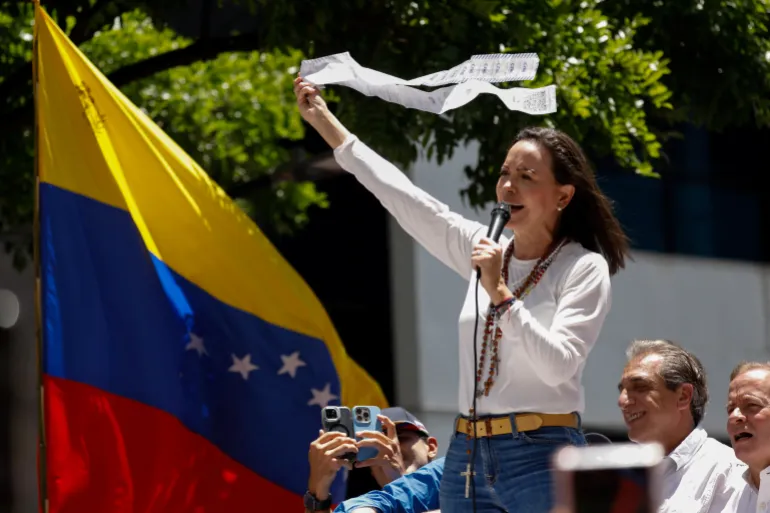In a dramatic turn that has drawn global attention, Venezuelan opposition leader María Corina Machado has been named the winner of this year’s Nobel Peace Prize, outshining powerful contenders including U.S. President Donald Trump, who waged an aggressive public campaign for the honour.
Announcing the decision in Oslo, the Norwegian Nobel Committee praised Machado for her “tireless work promoting democratic rights for the people of Venezuela and her struggle to achieve a just and peaceful transition from dictatorship to democracy.”
Machado, 58, has long been a symbol of resistance against the authoritarian regime of President Nicolás Maduro. Barred from contesting last year’s presidential elections, widely dismissed by international observers as neither free nor fair, she has spent much of the past year in hiding to evade political persecution.
Read Also:
Can Donald Trump win Nobel Peace Prize?
Starmer hails Trump’s leadership in Gaza peace deal
Upon hearing of her award, an emotional Machado said, “I’m in shock… shocked with joy.” Her supporters erupted in celebration across Venezuelan cities, calling the recognition a “victory for democracy” and a “rebuke to tyranny.”
The Nobel Committee’s decision is seen as a powerful endorsement of grassroots democratic movements worldwide and a reminder that moral courage can outweigh political power.
Trump’s Public Plea for Recognition Falls Flat
While Machado’s win inspired global admiration, President Trump’s conspicuous campaign for the prize has been met with widespread criticism. The U.S. leader had mounted what analysts described as an “unprecedented lobbying effort”, placing intense pressure on the five-member Norwegian Nobel Committee.
Posting repeatedly on his Truth Social platform, Trump argued that denying him the award would be “an insult to the United States.” He claimed personal credit for “solving six wars,” citing peace efforts between Israel and Arab states, India and Pakistan, Rwanda and Congo, Armenia and Azerbaijan, and Thailand and Cambodia.
Trump also highlighted his role in brokering the 2020 Abraham Accords, which normalised relations between Israel and several Arab nations, calling them “historic peace achievements unmatched in modern history.”
Despite his self-promotion, experts noted that nominations for this year’s Nobel Peace Prize closed in January, shortly after Trump began his second term in office. That technicality effectively ruled out any new lobbying efforts.
Israeli Prime Minister Benjamin Netanyahu was among a handful of world leaders who reportedly nominated Trump earlier in the year, but the committee remained unmoved.
Global Reactions: Courage Over Clout
Reactions to the announcement have been swift. European diplomats and human rights advocates hailed the choice of Machado as “a triumph of conscience over ego.”
“This award affirms that the Nobel Peace Prize is not for those who shout the loudest about peace,” said a senior EU official in Brussels, “but for those who live it under the most dangerous conditions.”
In contrast, Trump’s supporters took to social media to denounce the decision, calling it “politically biased.” Yet, many analysts believe his overt lobbying undermined his credibility and exposed a troubling sense of entitlement.
For Venezuela’s embattled opposition, Machado’s win represents both moral validation and a renewed spotlight on the country’s democratic crisis.
As one Caracas activist put it, “Trump campaigned for prestige; Machado fought for her people. The world has chosen wisely.”



